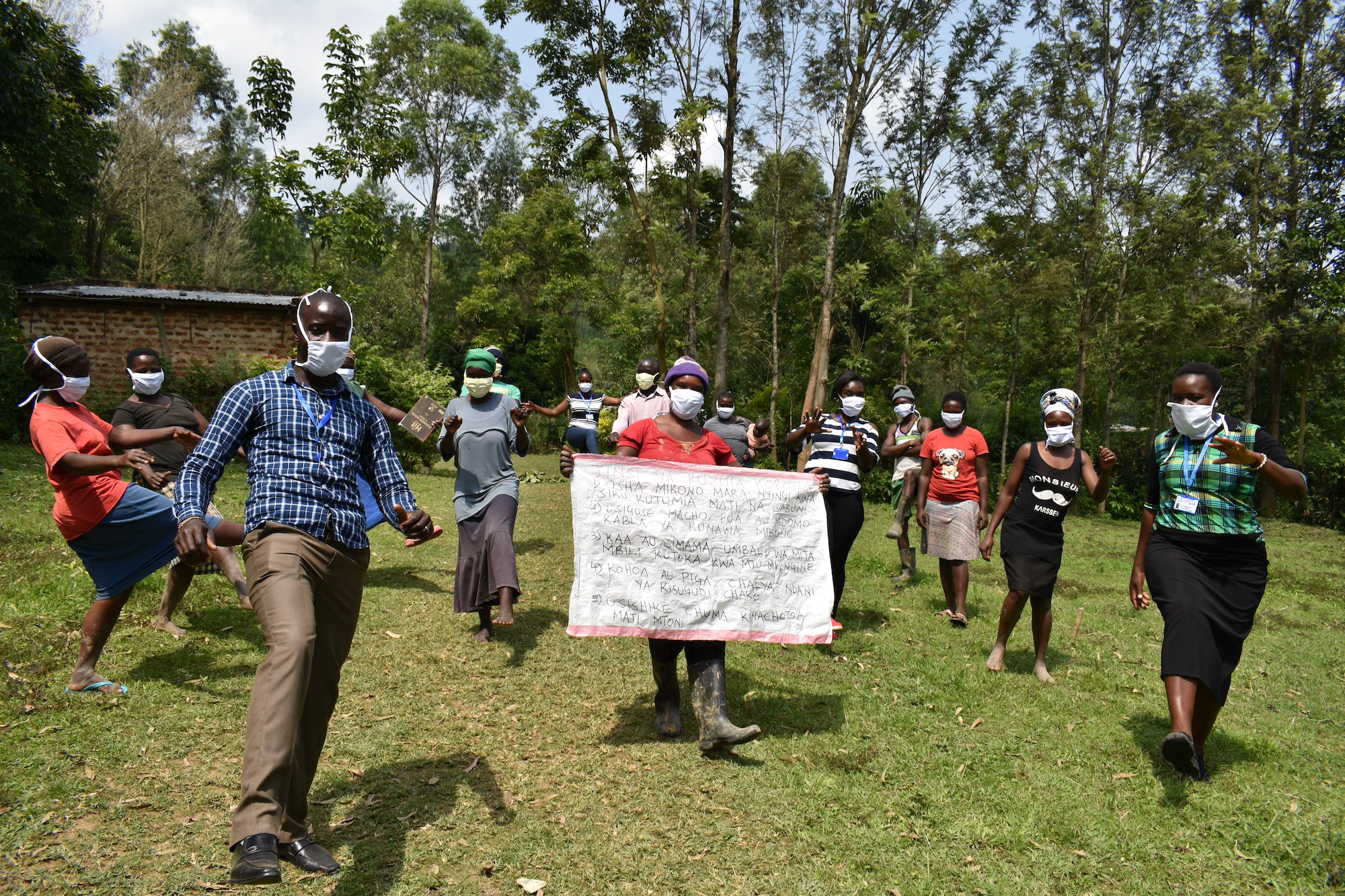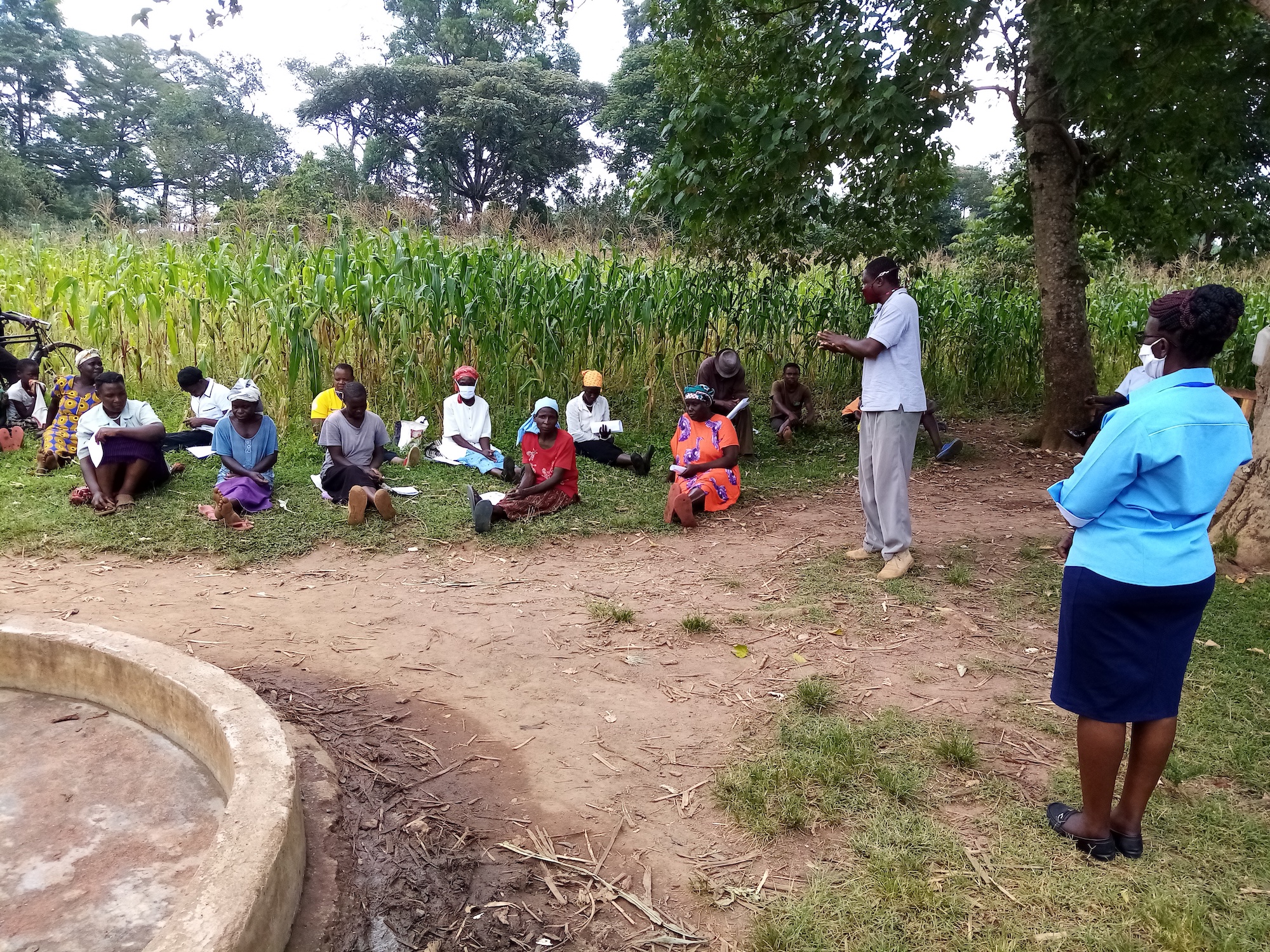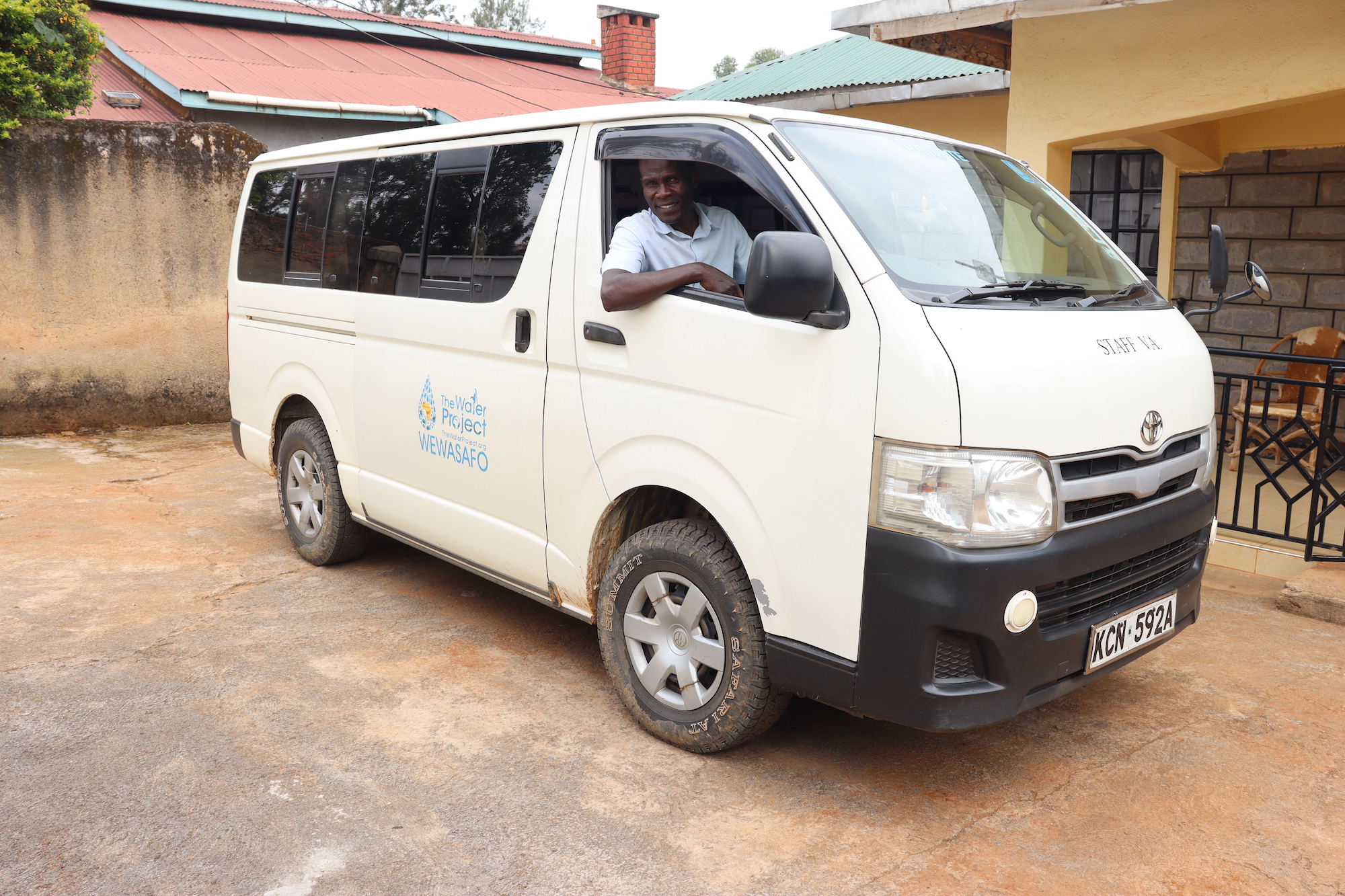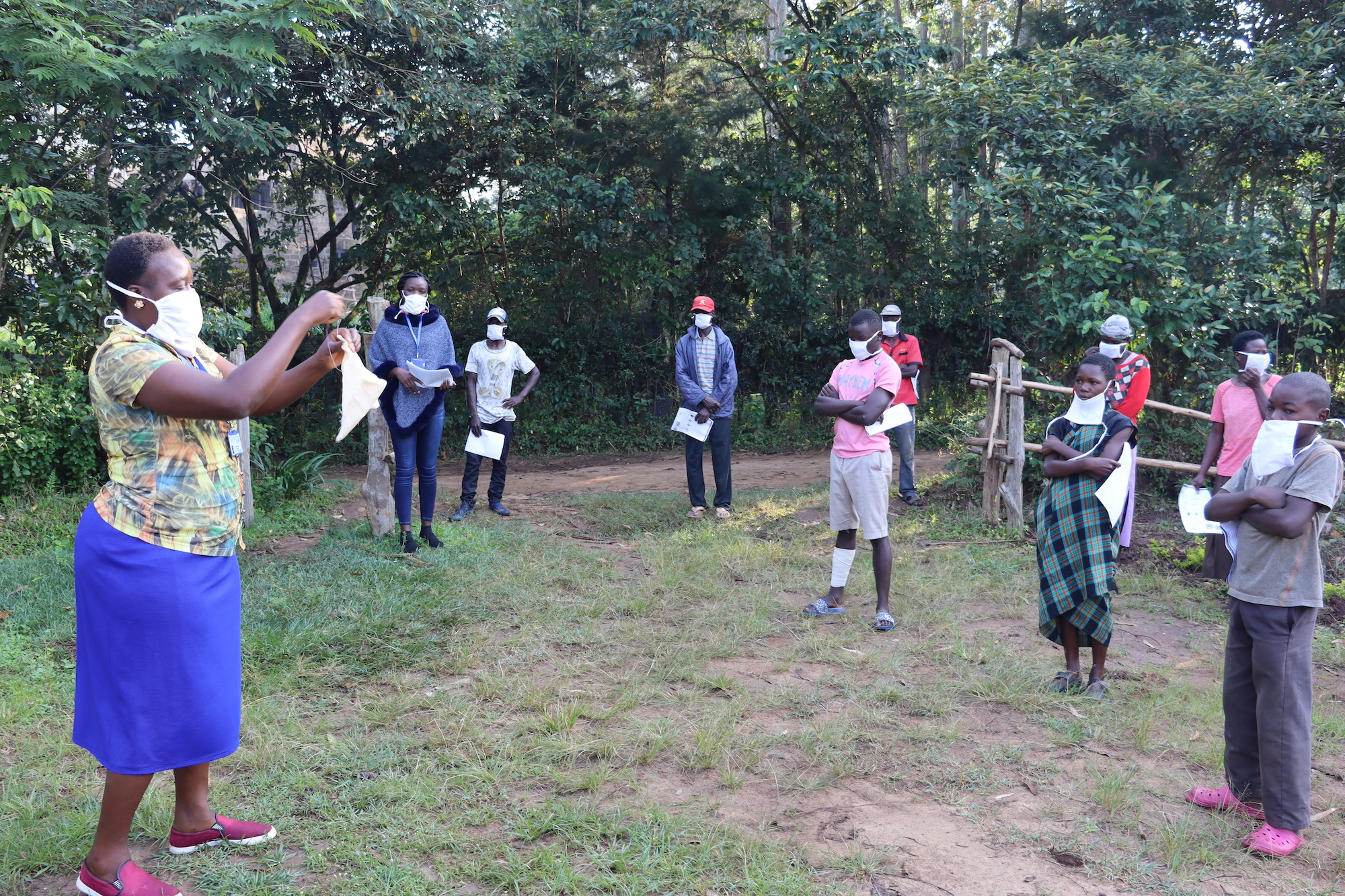Reflecting on challenges and triumphs from early days of COVID-19 sensitization
More than a year and a half into the pandemic, time can feel both like it has flown and dragged on. Yet here we are still grappling with a deadly virus, but bolstered every day with increasing knowledge on prevention and care. For our teams worldwide, each country has faced unique waves of the virus and the coinciding regulations helping to keep people safe.
In Kenya, the third and most intense wave of recorded case numbers is just starting to decline (based on highly limited testing data). From national curfews and total lockdowns between counties and cities to children missing almost a year of in-person learning at school, a lot has changed in these last eighteen months across the country.
Within a few short months of the pandemic’s onset , our teams successfully reached every community The Water Project had ever worked with across Kenya, directly training 8,300 people on COVID-19 prevention and control.
The teams worked long and hard days to reach every community as quickly as possible. In the midst of this work, two directors based in western Kenya recorded memories from their early days of traveling throughout the region to help sensitize communities about the new virus.
Below are excerpts from these logs. Catherine Chepkemoi of the Kakamega-based team and Humphrey Buradi of our Regional Service Hub shared reflections from some of the hardest and most rewarding parts of their work in the early days of the pandemic.

Trainers from Catherine’s team together with community members show how they are helping to “Kick Corona out of Kenya!” through the knowledge gained from their sensitization training in June, 2020. In the center, a community member holds a sign with prevention tips in the local language that was later affixed to their water point’s fence to serve as a daily safety reminder.
From the desk of Catherine Chepkemoi, May 8, 2020:
“The COVID-19 training for the beneficiaries of Walibese Spring was so rich in things to remember. It happened that the day of the training, as fate had it, it rained so early in the day. The feeder roads from the tarmac road that we were using to reach the training venue were barely a week old from the time the Kenya Rural Authorities tried to make it passable for motor vehicle users.”
“Having been drenched by the pondering mid-day rains, the road was not only slippery, but it slowed us down so much so that we arrived at the venue a bit later than we had anticipated. However, our spirits were lifted by the warm welcome we received from the women and children, who were all along expecting our arrival with bated breath.”

Community members committed to the training despite the downpour.
“No sooner had they sensed our arrival than they started to send signals to each other to assemble at the training venue, albeit it was heavily pouring down, for the windows of heavens were left ajar. And as if that was not enough, this audience bravely stood in the rain and asked that we train them about COVID-19. They could not trade this message for anything.”
“A few who had their umbrellas on them shared them with their family members, but even for some who had no such privilege to be sheltered under an umbrella, they too overlooked the rain and availed themselves to be taught. I am yet to find another community with such a team of mothers and children who are so resilient and brave to bear a little pain for greater and better gain: being equipped to fight and kick COVID-19 as far away as nowhere near their residences.”
Trainer Erick Wagaka leads community members who use Walibese Spring in Endeli, Kenya in a recap of their COVID-19 prevention and sensitization training.
From the desk of Humphrey Buradi, June 17, 2020:
“The most memorable day was when we visited Musidi community for our first COVID-19 impact interview,” a special interview series we conducted to highlight the personal impacts of the pandemic on the lives of the community members we serve.
“The participants were very receptive and welcoming. Like most communities, they were in high expectation of receiving free masks from us. The facilitator countered their expectations by demonstrating to them how simple it is to fabricate a mask. They were left in awe of the knowledge that they had just received and no longer felt helpless in the fight against the virus.”
“After the training, Mr. Elphas Wechuli and a few other community members gave us various gifts as tokens of appreciation for the training. The ladies were given two kilograms each of beans and an additional ten guinea fowl eggs for hatching. I received a turkey egg and a live chicken to take home while the gents were given young chickens to rear and enjoy on Christmas. We really felt honored as this was a gesture of how they valued the training.”

Mr. Elphas Wechuli (standing) speaks to his community during the COVID-19 sensitization training.
From the desk of Catherine Chepkemoi, June 17, 2020:
“The training at Mark Ashikuku Spring was done in the wee hours of the morning when our van slowly arrived on the homestead of Mr. Mark Ashikuku in Ejinja Village. The van was carrying six WASH staff who had braved the chill and the fear of COVID-19 that morning to undertake the training.”
“Mobilization for this site had taken more than two weeks as the community members kept on postponing the training day. This was due to the high fear that was amongst the community members that no visitor was allowed in the village as they could not trust non-residents of the village. As we traveled, we made our silent prayer so that this community would allow us to train them as we knew the importance of the training.”

Team Driver and Administrative Assistant Ken Walumbe in one of the staff vans used to ferry teams to their training and project sites.
“When we arrived at Mr. Mark Ashikuku’s homestead, he emerged from the garden with a machete, and cold chills ran through our spines as we expected the worst from him. There was no single participant who had arrived for the training due to the fear that was going around in the name of ‘We should be careful with nonresidents in this village because some of them may bring here Coronavirus.’ At this point, we stepped out from the van slowly, unsure of what Mark Ashikuku would do.”
“One of our WASH staff stood forward and braved the fear, then started to chat with him while informing him of our objective. He relaxed after seeing the logo on the van and identified with it. (He later confessed that it was difficult to identify us with our masks on). The protective gear we had on gave him confidence that even if we had the virus, we could not infect them.”
“Finally, he welcomed us. As we started engaging with him and setting up our training apparatus, a few neighbors joined us. The staff distributed COVID-19 print-outs, and everyone became curious to learn about the disease. When the topic of mask demonstration was mentioned, it got the interest of the bystanders who started moving closer and closer. In no time, we had a good quorum, and the training progressed well, though while standing, as we observed social distance. They asked various questions that were disturbing them and were answered well.”

Trainer Karen leads the homemade mask tutorial at the Mark Ashikuku Spring COVID-19 sensitization training.
Tweet